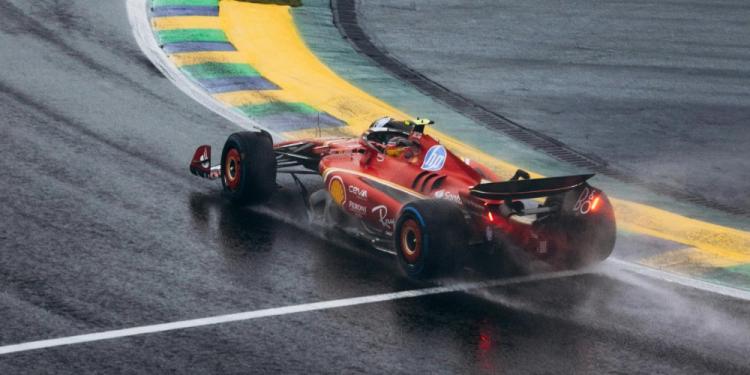Formula 1 Is Boring – How To Invigorate An Increasingly Dull Sport
Posted: December 20, 2024
Updated: December 20, 2024
Being more concerned about the money sponsors can bring to the table rather than providing the best sporting action for fans has left many wondering whether Formula 1 even cares about the public perception of the sport. It's become a boring parade of advertisements stuck on the side of cars.

Formula 1 has long been heralded as the pinnacle of motorsport, showcasing cutting-edge technology, jaw-dropping speeds, and elite drivers battling it out on circuits around the globe. But as you settle in to watch yet another Grand Prix, you might find yourself asking a pressing question: why has Formula 1 become so self-centred and boring? For spectators craving excitement and sports bettors looking for a fair shot at a payday, Formula 1 increasingly feels like a stale and predictable affair. Despite its rich history and undeniable glamour, the sport has devolved into a monotonous display where only a handful of participants seem to matter.
This Gamingzion.com article explores the reasons Formula 1 has become dull for fans and bettors alike. We’ll trace its illustrious history, pinpoint the issues with its modern iteration, and examine how the sport could reinvigorate its appeal. We’ll also dive into the mechanics of Formula 1 betting and why it, too, has lost much of its allure. By the end, you’ll see why so many fans and bettors are frustrated and yearning for change.
The Golden Era – When Formula 1 Captured Hearts
To appreciate why Formula 1 is boring today, you have to understand what made it captivating in the first place. The golden eras of Formula 1 saw unpredictable races, fierce rivalries, and genuine risk. Think back to the 1970s and 1980s, when world-class drivers like Niki Lauda, Aryton Senna, and Alain Prost were as much gladiators as they were racers. Each race was an unpredictable spectacle, full of wheel-to-wheel battles, daring overtakes, and heartbreaks that defined the sport’s narrative.
Even as recently as the early 2000s, you had dominant drivers like Michael Schumacher. However, the competition remained fierce enough to keep you guessing. Teams like McLaren relied on strategy, grit, and luck to claim victories. Back then, anyone from a midfield team to a rookie driver, could shine under the right circumstances. For bettors, this unpredictability meant value-packed odds. It also created a sense of real excitement, especially if you were staking money on a long shot.
Contrast all that excitement with today’s sad spectacle. The dominance of certain teams, notably Red Bull and Mercedes over the last decade, has led to predictability that erodes the thrill. Drivers often race not to win but to maintain their position. Safety advancements, while crucial, have also sanitized much of the sport’s raw intensity. What’s left is a polished but sterile product. One that rarely delivers the drama you came to expect from Formula 1’s glory days.
Formula 1 Is Boring Thanks To Predictable Outcomes
If there’s one word that encapsulates why Formula 1 is boring, it’s predictability. In recent years, certain teams have so thoroughly dominated that races often feel like foregone conclusions. For instance, during Lewis Hamilton’s era of dominance with Mercedes, it seemed almost guaranteed he’d be on the podium.
The 2023 season saw similar dominance from Red Bull and Max Verstappen, who clinched the championship with races to spare. This predictability has dire consequences for spectators. As a fan, you tune in hoping to witness history. But instead, you get a procession of cars lapping in order. Overtaking opportunities are limited, and races frequently hinge on pit-stop strategy rather than genuine on-track battles.
For sports bettors, the lack of unpredictability is even worse. Formula 1 betting thrives on the potential for unexpected outcomes. Things like the upset victory, the dramatic crash, or the strategic masterstroke. When the same driver and team consistently dominate, odds become unappealing. A Verstappen win might have odds so short that it’s barely worth betting. Conversely, the long-shot bets on lower-ranked drivers rarely pay off because their chances are so slim in today’s unbalanced field. This predictability undermines the excitement of watching a race. Furthermore, it also erodes the very fabric of Formula 1 as a competitive sport. Until this issue is addressed, fans and bettors alike will continue to lose interest.
The Technology Arms Race – Impressive Yet Alienating
Part of what made Formula 1 historically thrilling was the human element. Drivers pushed themselves and their cars to the absolute limit, and their skill behind the wheel often determined the outcome. Today, technology has taken precedence to such an extent that it often feels like machines, not humans, are racing.
Modern Formula 1 cars are engineering marvels. Aerodynamics, hybrid power units, and advanced telemetry systems have made them faster and more efficient than ever. However, these advancements have also made the sport more inaccessible and less relatable. When was the last time you genuinely understood a commentator’s explanation of a technical regulation change? Probably never. This technical complexity alienates casual fans, turning races into a science experiment rather than an entertaining spectacle.
For sports bettors, the emphasis on technology creates additional challenges. Understanding which team has the most competitive package requires analyzing a dizzying array of data, from wind tunnel test results to power unit upgrades. This barrier to entry makes Formula 1 betting less accessible compared to other sports where outcomes are more straightforward. By prioritizing engineering over racing, Formula 1 has sidelined the very drama and unpredictability that once defined it. As a result, both fans and bettors feel detached from the action.
The Calendar Overload – Quantity Over Quality
Another reason why Formula 1 is boring today is its bloated calendar. In the quest for global expansion and greater revenue, the sport now features over 20 races per season. While this might seem like a good thing on paper, the reality is far less exciting. A crowded schedule dilutes the significance of each race. When there’s a Grand Prix almost every weekend, it’s hard to maintain a sense of anticipation or importance. Compare this to the World Cup or the Olympics, where scarcity heightens excitement. In Formula 1, a victory feels less monumental when there’s another race just days away.
From a betting perspective, the sheer volume of races can be overwhelming. Keeping up with developments, analyzing form, and placing strategic Formula 1 bets becomes a time-consuming endeavor. Moreover, bettors might find themselves burned out by the repetitive nature of the races. This is especially true when the outcomes are often so predictable. By prioritizing quantity over quality, Formula 1 risks alienating both its core fanbase and potential new audiences. A streamlined calendar with fewer, more meaningful races could help restore the excitement and drama that the sport sorely lacks.
Overemphasis On Certain Teams And Drivers
One of the most glaring reasons Formula 1 is boring today is its disproportionate focus on a few top teams and drivers. In an era dominated by Red Bull, Mercedes, and Ferrari, the midfield and backmarker teams often feel like an afterthought. The sport’s narrative revolves around a small handful of personalities. This leaves little room for others to shine. As a fan, this narrow focus can make the experience feel repetitive. After all, you see tons of coverage of the same few drivers, while others receive little to no attention. This lack of diversity in storytelling diminishes the overall appeal of the sport.
For bettors, the emphasis on top teams creates a lopsided betting market. Odds from even the best online sportsbooks in the US for a top-three finish are heavily skewed in favour of the usual suspects. Yet long-shot bets on midfield drivers rarely feel worth the risk. The imbalance in competitiveness stifles creativity and strategy, making Formula 1 betting less engaging compared to sports like football or horse racing, where underdogs frequently upset the odds. To rekindle interest, Formula 1 needs to level the playing field. Greater competition among teams would not only make races more exciting but also reinvigorate the betting landscape, providing more opportunities for value-packed wagers.
Dull Circuits Ensure Formula 1 Is Boring
Another factor contributing to why Formula 1 is boring is the nature of its circuits. Over the years, the sport has added several new tracks designed more for corporate hospitality than thrilling racing. These modern circuits, often characterized by wide run-off areas and lack of elevation changes, fail to produce the kind of wheel-to-wheel battles that make for great racing. Compare this to classic circuits like Spa-Francorchamps, Monza, or Suzuka. These tracks have personality, history, and challenging layouts that test both drivers and cars. Unfortunately, Formula 1’s calendar is increasingly filled with sterile street circuits and modern venues that prioritize safety and spectacle over pure racing.
For sports bettors, circuit design plays a crucial role in determining outcomes. Traditional tracks with unpredictable weather or unique layouts offer more betting opportunities, from forecasting safety cars to predicting unexpected podiums. Modern tracks, by contrast, tend to favor the fastest car and exacerbate the dominance of top teams, further reducing the betting appeal. To restore its excitement, Formula 1 needs to rethink its approach to circuit selection. Emphasizing challenging, character-filled tracks would not only make races more entertaining but also create more dynamic betting opportunities.
Formula 1 Betting – A Shadow Of Its Former Self
If you’re a sports bettor, you’ve likely noticed that Formula 1 betting has become less enticing. The sport’s predictability means that markets like outright race winners or championship bets are dominated by the same few names, offering little value. For example, a Max Verstappen win might have odds so short that it’s barely worth considering. Beyond outright winners, other betting markets include podium finishes, fastest laps, and head-to-head matchups between drivers. While these options provide some variety, the sport’s broader issues still hamper them. The dominance of top teams makes it difficult to identify value bets, while the lack of unpredictability reduces the thrill of taking a punt on an underdog.
The rise of live betting at sportsbooks like Bet365 Sportsbook has added some excitement. But even this is limited by Formula 1’s inherent structure. Unlike sports with constant action, Formula 1 races often feature long stretches of procession, making live betting less engaging. For Formula 1 betting to regain its appeal, the sport must address its core issues. This includes greater competitiveness among teams. We need more unpredictable races as this would create a richer betting landscape, giving fans and bettors alike a reason to stay invested.
Formula 1 Is Boring With Over-Regulation
As noted by online gambling news in the US, one of the less discussed reasons Formula 1 is boring is the excessive regulation that governs every aspect of the sport. While we’ll be the first to agree that rules are necessary for fairness and safety, the current framework often stifles creativity and spontaneity. From grid penalties to track limits, modern Formula 1 can feel more like a bureaucratic exercise than a thrilling competition. As a fan, these regulations can be frustrating. Moments of excitement are frequently overshadowed by post-race penalties or decisions from race stewards. For example, a driver’s hard-fought overtake might be undone by a five-second time penalty for exceeding track limits.
For sports bettors at online betting platforms like Bet365 Sportsbook, over-regulation adds another layer of complexity. Predicting outcomes becomes harder when races decided in the stewards’ room rather than on the track. This unpredictability, while occasionally thrilling, often feels arbitrary. It detracts from the overall betting experience. To revive its appeal, Formula 1 needs to find a balance between regulation and freedom. Allowing drivers to take more risks and encouraging innovation among teams would inject much-needed excitement into the sport.
How Formula 1 Can Save Itself
So, how can Formula 1 become exciting again? Though solutions aren’t simple, we believe they are achievable. First, the sport needs to address its competitive imbalance. Introducing budget caps, more equitable prize money distribution, and stricter technical regulations could level the playing field. It’ll give smaller teams a more equal chance to compete. Second, Formula 1 should prioritize thrilling circuits over corporate-friendly venues. Returning to classic tracks and introducing new ones with challenging layouts would create more dynamic racing and unpredictable outcomes.
Finally, the sport must embrace the human element. Highlighting driver personalities, reducing over-regulation, and fostering rivalries. All these things could help to make Formula 1 more relatable and engaging. For sports bettors, these changes would reinvigorate the betting landscape, offering more opportunities for excitement and reward.
Formula 1 Is Boring – Time For Change
The truth of the matter is that Formula 1 is boring because it has lost touch with what made it great. Today it’s a sport with an obsession with technology. Coupled with the dominance of a few teams, along with over-regulation, have turned it into a predictable and sterile affair. For fans and bettors alike, there’s no thrill. But it doesn’t have to be this way. By addressing its core issues, Formula 1 can reclaim its status as the world’s premier motorsport. Until then, you might find yourself tuning out and looking elsewhere for excitement. It’s a sad state of affairs for a sport that once captured imaginations around the globe.
Click here to try the best odds at bet365 Sportsbook












